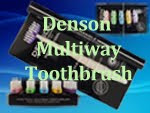Tynex® is a registered trademark of DuPont for its brand of nylon filament.
Only DuPont makes Tynex®.
Product Characteristics
Premium-quality Tynex® filaments, the result of DuPont’s advanced
research and engineering, meet the most demanding requirements of brush
makers and consumers for toothbrushes and personal-care brushes of the
highest quality.
Significant benefits and extra values are:
a) Surface Finish
b) Packaging
c) End-Rounding
d) Color Uniformity
e) Caliper Uniformity
a) Surface Finish
DuPont’s proprietary finish enhances tufting
efficiency and productivity. This finish complies
with United States Food and
Drug Administration (FDA) regulations.
with United States Food and
Drug Administration (FDA) regulations.
b) Packaging
The diameter consistency of DuPont’s paperwrapped
hanks meets or exceeds the stringent
requirements of new autoload toothbrush
machines.
c) End-Rounding
High quality materials and precise process control give
optimum end-rounding performance.
d) Color Uniformity
Pigmenting technology and special colormeasuringmethods maintain close color tolerances.
e) Caliper Uniformity
DuPont technology and high-precision laser
micrometers assure maximum control of
filament diameter.
Chemical Properties
Tynex® 612 nylon filaments are not affected by
chlorinated solvents, such as carbon tetrachloride,
chloroform, trichlorethylene; petroleum
hydrocarbons, such as gasoline, benzene,
naptha, toluene, kerosene; ester solvents, such
as butyl acetate, amyl acetate; or detergents,
such as soap, trisodium phosphate, trisodium
phosphate-soda ash.
Tynex® may become limp in contact with
methanol or ethanol, but will regain its original
stiffness after evaporation of these solvents.
Other alcohols have little or no effect on
Tynex®.
Tynex® is more resistant to attack by acids than
many other brush filling materials. However,
acids may cause some degradation of Tynex®
depending upon the nature and concentration of
the acid and the conditions under which the
filaments are used. Before using Tynex® with
acids, it is recommended that tests be made
under conditions which may be expected in
actual use.
Tynex® filaments are attacked by phenol and
chemically related compounds.
Effect of Moisture
Tynex® 612 nylon filaments absorb small
quantities of water. The effect of this water
absorption is a temporary decrease of stiffness
and bend recovery while they are wet. This
effect is compared below with commercial
Nylon 66.
Resistance to Fungi, etc.
Tynex® 612 nylon filaments are resistant to
attack by rodents, insects, and fungi, and thus
may be safely stored for long periods without
damage.
Effect of Temperature
The properties of Tynex® 612 nylon filaments
are not permanently affected by continuous
exposure to temperatures up to 65°C (149°F).
They do become slightly degraded on long
exposure at high temperatures. For example,
they begin to show a slight loss in strength
after several months at 100°C (212°F); and
after days at 180°C (356°F)—all in the presence
of air. Melting point for Tynex® is approximately
212°C (412°F). Extended
exposure at 150°C (302°F) in an inert atmosphere
has no lasting effect. Continued exposure
to steam, especially in the presence of
acids or bases, will gradually weaken Tynex®
filaments.
End-rounding performance is unsurpassed using Tynex® nylon
filaments.DuPont’s proprietary extrusion process and optimized
612 nylon polymer provide superior results using conventional
toothbrush making equipment.
In this magnified toothbrush tuft, note the smoothness
of individual ends in this scanning electron microscope (SEM)
photograph of Tynex® 8 mil (0.20 mm) diameter natural
color nylon filament.































No comments:
Post a Comment